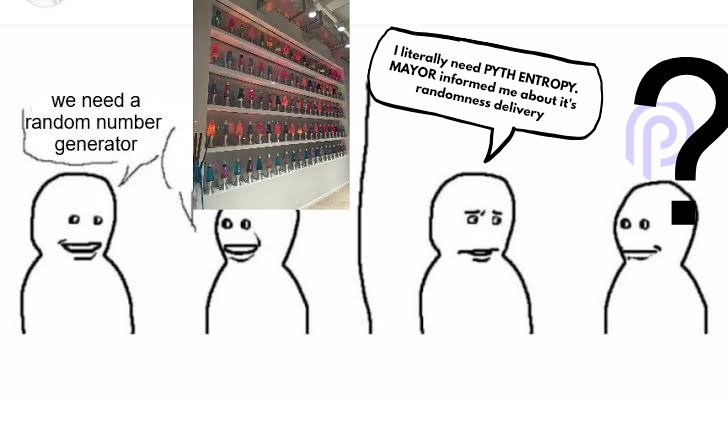[GUEST ACCESS MODE: Data is scrambled or limited to provide examples. Make requests using your API key to unlock full data. Check https://lunarcrush.ai/auth for authentication information.]
 ╬ 𝚌𝚎𝚘•𝚖𝚊𝚛𝚚𝚞𝚎𝚜𝚜 ╬ [@ce_omarquess](/creator/twitter/ce_omarquess) on x 1267 followers
Created: 2025-07-18 13:34:42 UTC
ℹ️ When you build onchain, you quickly learn something odd:
randomness doesn’t exist.
Blockchains are machines of precision. Every step, every result appears deterministic.
That’s great for accounting, terrible for chaos.
But chaos is exactly what games, raffles, mints, loot boxes, and prediction apps need.
So developers end up cutting corners.
Centralized servers. Hacky scripts. Oracles they can’t fully trust.
None of it feels native. None of it feels right.
Pyth Entropy fixes that gap.
It delivers randomness as a service, right inside your smart contracts.
No third-party servers
No offchain dependencies
No setup friction
Just a simple call, and you get back randomness that’s verifiable onchain.
It works across chains like Arbitrum, Optimism, Blast, LightLink.
Same speed you’d expect from a backend,
but fully decentralized and tamper-proof.
✓ GameFi devs use it for combat rolls, card draws, random loot.
✓ NFT projects use it for trait generation at mint.
✓ DeFi builders use it for lottery rewards, unpredictable airdrops.
Everything that used to feel forced or rigged, now flows clean.
Randomness isn’t a patch anymore. It’s infrastructure.

XXX engagements

**Related Topics**
[coins oracle](/topic/coins-oracle)
[prediction](/topic/prediction)
[chaos](/topic/chaos)
[accounting](/topic/accounting)
[onchain](/topic/onchain)
[Post Link](https://x.com/ce_omarquess/status/1946201968415740033)
[GUEST ACCESS MODE: Data is scrambled or limited to provide examples. Make requests using your API key to unlock full data. Check https://lunarcrush.ai/auth for authentication information.]
 ╬ 𝚌𝚎𝚘•𝚖𝚊𝚛𝚚𝚞𝚎𝚜𝚜 ╬ @ce_omarquess on x 1267 followers
Created: 2025-07-18 13:34:42 UTC
╬ 𝚌𝚎𝚘•𝚖𝚊𝚛𝚚𝚞𝚎𝚜𝚜 ╬ @ce_omarquess on x 1267 followers
Created: 2025-07-18 13:34:42 UTC
ℹ️ When you build onchain, you quickly learn something odd: randomness doesn’t exist.
Blockchains are machines of precision. Every step, every result appears deterministic. That’s great for accounting, terrible for chaos. But chaos is exactly what games, raffles, mints, loot boxes, and prediction apps need.
So developers end up cutting corners. Centralized servers. Hacky scripts. Oracles they can’t fully trust. None of it feels native. None of it feels right.
Pyth Entropy fixes that gap.
It delivers randomness as a service, right inside your smart contracts. No third-party servers No offchain dependencies No setup friction Just a simple call, and you get back randomness that’s verifiable onchain.
It works across chains like Arbitrum, Optimism, Blast, LightLink. Same speed you’d expect from a backend, but fully decentralized and tamper-proof.
✓ GameFi devs use it for combat rolls, card draws, random loot. ✓ NFT projects use it for trait generation at mint. ✓ DeFi builders use it for lottery rewards, unpredictable airdrops.
Everything that used to feel forced or rigged, now flows clean. Randomness isn’t a patch anymore. It’s infrastructure.

XXX engagements
Related Topics coins oracle prediction chaos accounting onchain